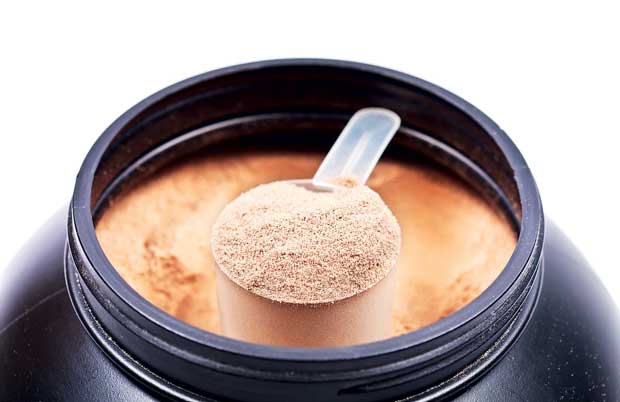Reply To:
Name - Reply Comment

 Keeping fit has become a challenge with today’s busy lifestyles. But for those who take extra care with their health, maintaining a healthy fitness regimen has become a habit. Protein supplements are an essential component of fitness schedules but to what extent these supplements should be consumed has remained a question. Speaking to Health Capsule, Tiron Wickramasinghe Certified Fitness Instructor from International Sports Science Association USA, who has over fifteen years of experience in the industry, elaborated on the intake of protein supplements, in what instances they should be used and how to use them wisely.
Keeping fit has become a challenge with today’s busy lifestyles. But for those who take extra care with their health, maintaining a healthy fitness regimen has become a habit. Protein supplements are an essential component of fitness schedules but to what extent these supplements should be consumed has remained a question. Speaking to Health Capsule, Tiron Wickramasinghe Certified Fitness Instructor from International Sports Science Association USA, who has over fifteen years of experience in the industry, elaborated on the intake of protein supplements, in what instances they should be used and how to use them wisely.
Q In what instances are protein supplements recommended?
High-quality protein or protein powder is convenient for making an on-the-go protein shake when you are out and about. The powder itself needs no refrigeration and you can easily mix it with juice or water at the gym or on the road to help maintain your daily protein intake. Depending on the source of the protein powder, it can offer specific fitness benefits. For instance, whey-based protein powders contain high levels of branched-chain amino acids. These amino acids, combined with an exercise programme, can help build muscle, prevent muscle breakdown and assist in post-exercise recovery.
Protein powders containing casein supply your body with slow-digesting forms of protein which ensures your cells receive a steady supply of this nutrient.

Q What are some of the key ingredients included in them?
Whey is one of the key ingredients in supplements. Whey is in fact a protein that makes up approximately 20 percent of the total protein content in cow’s milk. It is also a by-product of cheese manufacturing and has many commercial uses. Whey protein is the name given to globular proteins that are isolated from whey and are usually a combination of alpha-lactalbumin, beta-lactoglobulin and serum albumin. It may contain glycomacropeptides as well. Whey protein contains a rich amino acid profile. It is easily digestible and this facilitates easy absorption of protein and is useful for building muscle mass. It enhances the flow of nutrients to help rebuild and repair muscle tissue.
Q What is the recommended amount that should be consumed and how frequently should it be done ?
Step on a scale and be honest with yourself about your workout regimen. Highly trained athletes thrive on 0.77 gram of daily protein per pound of body weight. That’s 139 grams for a 180-pound man. In fact, men who work out for five or more days a week, for an hour or longer need 0.55 grams per pound. Men who work out 3 to 5 days a week for 45 minutes to an hour also need 0.45 grams per pound. So a 180-pound guy who works out regularly needs about 80 grams of protein a day.
On the other hand, if you’re trying to lose weight, protein is still crucial. The fewer calories you consume, the more calories should come from proteins. You need to boost your protein intake to between 0.45 and 0.68 gram per pound to preserve calorie-burning muscle mass.
Q If consumed in excess what are the side-effects ?
Excess dietary protein can lead to elevated blood sugar, weight gain, kidney stress, leaching of bone minerals and stimulating cancer cells. Restricting your protein to plant-only sources may create a sulphur deficiency and potentially accelerate age-related functional decline.
Q Should they be used only during training or working out?
The most important time is right after a workout. Your muscles are like a sponge and need instant nutrition for muscle recovery and growth. The other instances include right before bed; this means that you’re about to sleep for six to eight hours. That’s a long time without protein. Can you imagine going throug your day (while awake) not eating 6 to 8 hours?
It is also recommended to take proteins as soon as you wake up. Here again, you have just gone six to eight hours without proper nutrition and your body needs protein quickly.
Another instance where you need to have proteins is half an hour before a workout. This sets up the “anabolic window” before your workout and provides your muscles with adequate nutrition so that the effects of weight training (weight training breaks down muscle-called catabolic) are not as severe.
Q As a fitness instructor, can you give a message to the youth on how they should use supplements wisely?
If your lifestyle and sports require more protein, then protein supplements become important. The workout window also makes protein consumption from supplement sources important. It all depends on the person and if you can get your protein from food then more power to you. However, from my experience, I have found that most people do not get enough protein in their diet and therefore can benefit from a protein supplement.
Always consult your coach as they can help you with your protein consumption, amount and timing.